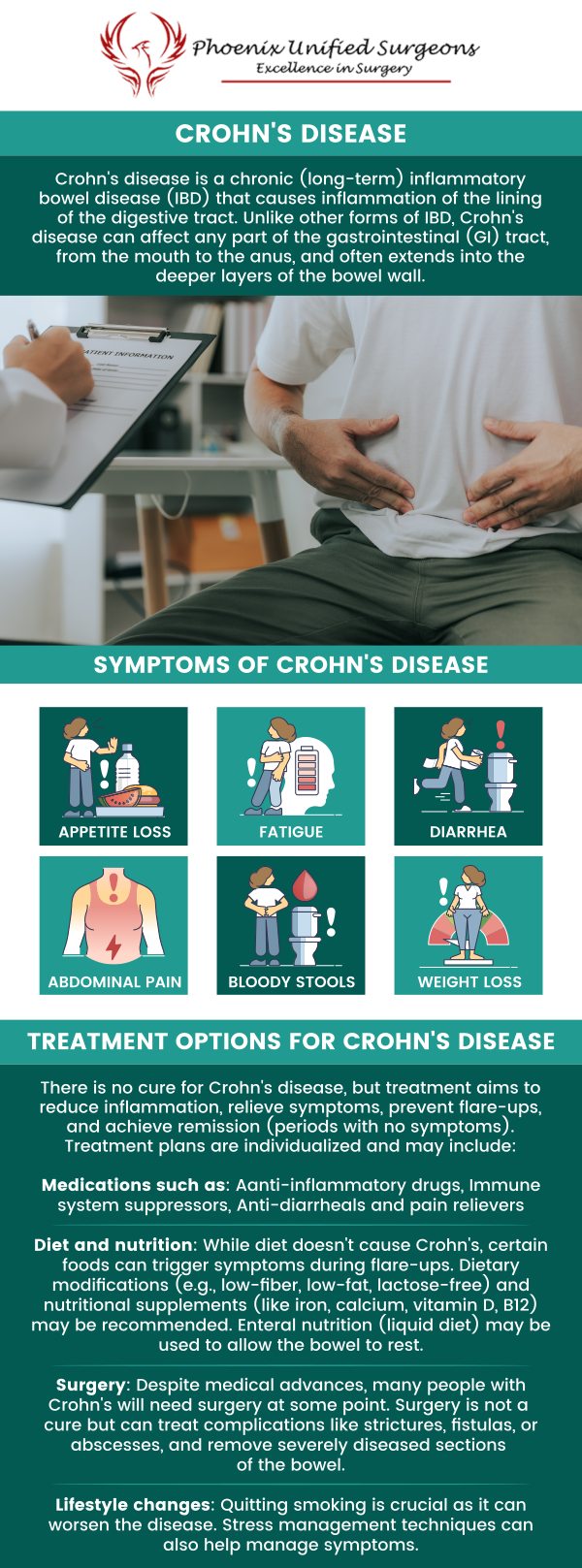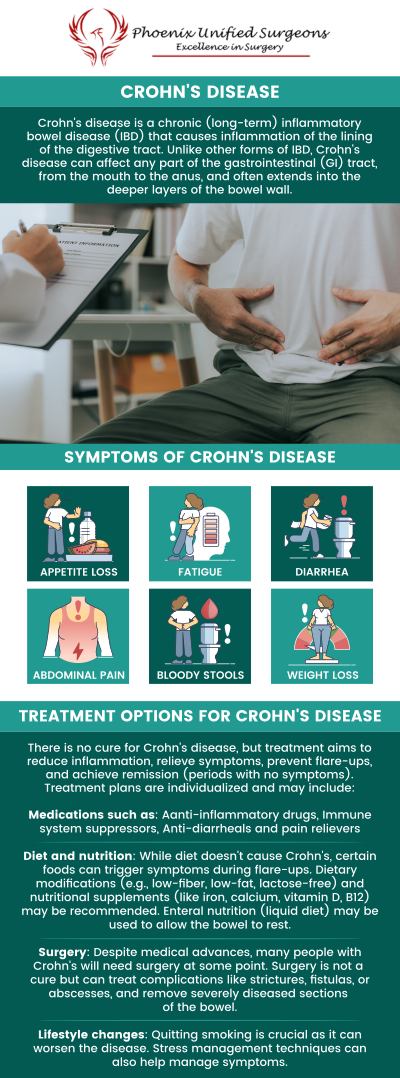Crohn’s Surgery Specialist in Phoenix, AZ
Crohn’s disease symptoms can vary widely but commonly include abdominal pain, diarrhea (sometimes bloody), fatigue, unintended weight loss, and fever. Other symptoms may include nausea, vomiting, loss of appetite, joint pain, and skin problems. Crohn’s disease can affect any part of the digestive tract and may also lead to complications such as bowel obstructions, ulcers, and fistulas. Dr. Debora J. Fox-McClary, M.D., MBA, FACS, FASCRS, specializes in Crohn’s surgery. Visit her at Phoenix Unified Surgeons for comprehensive care. We are conveniently located at 20333 N 19th Avenue, Ste 230 Phoenix, AZ 85027. For more information, contact us or request an appointment online.




Table of Contents:
What does a Crohn’s flare feel like?
Can you suddenly develop Crohn’s disease?
At what age is Crohn’s usually diagnosed?
What type of surgery is done for Crohn’s disease?
How long is recovery after Crohn’s surgery?
A Crohn’s flare can be highly disruptive and present a range of symptoms. You will feel generally unwell and fatigued, needing to visit the bathroom more than five times a day or waking up at night, often with diarrhea that can include blood for more than three days.
During a Crohn’s flare-up, severe stomach pain and cramping are common. In addition, you may also experience a fever, due to increased inflammation. Beyond digestive issues, Crohn’s flares can affect other parts of your body, causing skin rashes, eye pain, joint swelling, and mood changes.
Yes, you can suddenly develop Crohn’s disease. While symptoms of Crohn’s typically develop gradually, they can also appear quite suddenly and severely. This may be characterized by intense abdominal pain, severe diarrhea, fatigue, and weight loss. Some of the risk factors that may contribute to the onset of Crohn’s disease include genetics, immune system malfunctions, and environmental triggers.
Crohn’s affects people differently. Some people may experience mild symptoms for years before a significant flare-up makes the condition apparent, while others might face a sudden, acute onset of symptoms without much warning. Regardless of how Crohn’s disease starts, early diagnosis and treatment are crucial for effective symptom management.
If you experience sudden gastrointestinal symptoms such as severe abdominal pain, persistent diarrhea, or unexplained weight loss, it’s important to see a doctor promptly to have your concerns thoroughly assessed.
Crohn’s disease is most commonly diagnosed between the ages of 15 and 35, with the average age being around 29.5 years. Some people live with a silent form of Crohn’s, experiencing no noticeable symptoms, which means the disease can go undetected for years. Others experience mild symptoms that persist and gradually worsen, taking up to five years before a diagnosis is made. This delay in diagnosis is not uncommon, as initial symptoms are often subtle and may be mistaken for other gastrointestinal issues.
There’s no one-size-fits-all surgical treatment for Crohn’s disease. The type of surgery that’s right for you depends on a variety of factors, including the reason for surgery, the severity of your symptoms, and the part of your digestive tract that is affected. Some of the surgeries that are commonly performed for Crohn’s disease include:
• Strictureplasty – This procedure is performed to widen narrowed sections of the intestine that can cause blockages and alleviate symptoms without removing any part of the intestine, preserving as much of the digestive tract as possible.
• Bowel resection – Bowel resection involves removing the damaged part of the small or large intestine and connecting the two healthy ends. This surgery is used to remove diseased sections while maintaining as much healthy tissue as possible.
• Colectomy – In cases where the colon is severely diseased, a colectomy may be necessary. This surgery involves removing the colon while leaving the rectum intact.
• Proctocolectomy – When both the colon and rectum are badly damaged, a proctocolectomy is performed.
• End ileostomy – An end ileostomy is performed after a proctocolectomy. In this procedure, the end of the small intestine is rerouted through a small hole in the abdomen, known as a stoma. Waste is then collected in an ostomy bag, which is attached to the outside of the body.
The length of your recovery after Crohn’s surgery depends on the specific treatment you received and how well you follow the post-operative instructions outlined by the surgeon. Initially, you’ll spend a few days in the hospital for monitoring, pain management, and to ensure your digestive system functions properly. Once you return home, allowing your body to rest and recover is crucial, so you’ll need to avoid strenuous activities.
Over the next one to three months, you’ll gradually return to normal activities, with regular follow-up appointments to track your progress. Our surgeon will be closely monitoring your recovery and will guide you on when to reintroduce certain foods and resume more intense physical activities. We are conveniently located at 20333 N 19th Avenue, Ste 230 Phoenix, AZ 85027. For more information, contact us or request an appointment online. We serve patients from Phoenix AZ, Sun City AZ, Peoria AZ, Surprise AZ, Glendale AZ, Scottsdale AZ, and surrounding areas.
Check Out Our 5 Star Reviews



Additional Services You May Need
▸ Colon & Rectal Surgery
▸ Gallbladder Surgery
▸ Colonoscopy
▸ Wound Care
▸ Hernia Repair
▸ General Surgery
▸ Robotic and Minimally Invasive Surgery
▸ Appendectomy
▸ Colon Repair/Resection
▸ Lipoma & Cyst Removal
▸ Endoscopy and Colonoscopy
▸ Abdominal Pain
▸ Colon surgery for Diverticulitis
▸ Colon surgery for Colon Cancer
▸ Hemorrhoids
▸ Anal Fistulas
▸ Anal Pain Surgeries
▸ Colostomy Avoidance Surgery
▸ Fecal Incontinence Surgery
▸ Crohn’s Surgery
▸ Ulcerative Colitis Surgery






